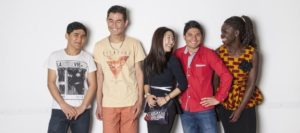Multicultural youth optimistic and engaged – study
 Young Australians from refugee and migrant backgrounds feel a sense of optimism and belonging even though they are subject to discrimination, the first ever census of multicultural youth.
Young Australians from refugee and migrant backgrounds feel a sense of optimism and belonging even though they are subject to discrimination, the first ever census of multicultural youth.
The study also revealed that most migrant and refugee children are confident in their ability to achieve their goals in work or study.
Almost 2,000 young people took part in the Multicultural Youth Australia Census, conducted by researchers from the University of Melbourne’s Youth Research Centre in September and October 2017.
While the majority (82 per cent) of participants ‘agreed’ or ‘strongly agreed’ that they feel they belong in Australia, almost half (49 per cent) experienced some form of discrimination or unfair treatment in the past 12 months.
Two-thirds (66 per cent) of those who experienced discrimination indicated this was because of their race, while one quarter (25 per cent) said they were discriminated because of their religion.
More than one-third (38 per cent) felt either ‘unsafe’ or ‘very unsafe’ when walking alone at night, with young women 3.7 times more likely to feel unsafe than young men.
According to the study, 87 per cent of participants said they felt ‘positive’ or ‘very positive’ about reaching their future goals, with the top two values and goals being ‘having a job they were passionate about’ (61 per cent) and ‘being active in working for a better society’ (45 per cent).
Almost half (49.6 per cent) said they were unemployed or underemployed, with racial discrimination the most commonly cited reason for why it was difficult to find work
University of Melbourne researcher Professor Johanna Wyn, said the census revealed that migrant and refugee youth were socially-connected and had strong civic and participatory outlooks.
She said if Australia wanted to live up to its image as the most successful multicultural society in the world, it was time to stop scapegoating migrant youth as criminals or extremists.
“It’s time to fund programs and create opportunities that capitalise on their optimism, civic capacities and desire to belong,” Prof Wyn said.
“The diversity of Australian society is shaped by migration, so we must do more to support these young people to feel valued and safe.”
RMIT university student Daniel Nye William Ton, who has African heritage, said he felt “positive about his future”.
“I’m am lucky because have opportunities my parents could not have dreamed of,” Daniel said.
“I feel like Australia’s an accepting country, a welcoming country.
“I don’t actually have any hesitance towards show my cultural identity as an African person or an Australian person. I just feel accepted either way,” he said.
The researchers say the census was an opportunity for multicultural youth to be heard, and to dismantle some of the unfair stereotypes often attributed to this group of overwhelmingly civic-minded young people.
The participants in the census came from 91 different countries. More than three-quarters were born overseas; 18 per cent were Australian born with at least one parent born overseas and 5 per cent were Australian born with both parents born in Australia.
They were also young; 45 per cent were aged 15-17, 25 per cent were 18-20 and 30 per cent were 21-25.
“The findings paint a positive picture and show that refugee and migrant youth are driven by hope and optimism,” the researchers said.
“Despite facing numerous challenges, the majority of refugee and migrant young people expressed confidence in their ability to achieve their goals,” they said.
Refugee and migrant youth identified diversity and discrimination as the most important issue facing Australia.
When asked about issues of personal concern they mentioned school or study problems in 20 per cent of cases and discrimination in 18 per cent.
“These are young people who, like many others, see their education as a foundation for a prosperous life, and place a great deal of importance on it,” the researchers said.
Laurie Nowell
AMES Australia Senior Journalist












